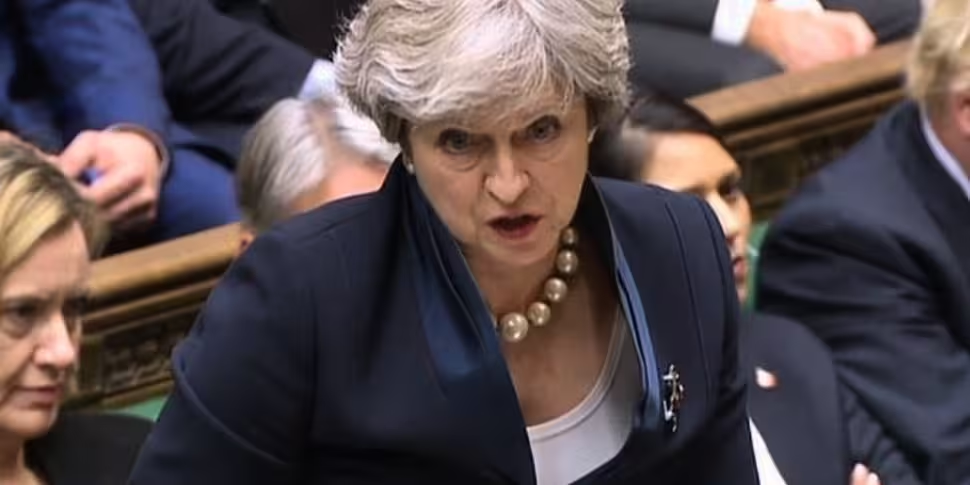Updated: 18.10
British Prime Minister Theresa May has said the Russian state was culpable for the attempted murder of a former spy and his daughter in Salisbury.
Sergei Skripal and his daughter Yulia remain in critical condition in hospital.
Mr Skripal (66) is a former Russian spy who sold secrets to MI6 before being jailed in Russia.
He was released in a spy swap deal in 2010 and has lived in Britain since.
He and his 33-year-old daughter were found slumped on a bench in a shopping centre on March 4th.
A police officer who was among the first on the scene was also seriously affected, but is recovering well.
In total, 38 people required treatment for the effects of the nerve agent novichok.
Mrs May has announced the expulsion of 23 Russian diplomats as part of a range of measures in response to the poisoning.
It is the biggest expulsion since the Cold War.
She also said no UK ministers or members of the royal family will attend the World Cup in Russia this summer.
Mrs May said the UK will suspend some high-level meetings and sanctions could follow.
Speaking in the House of Commons, she accused Moscow of being guilty of attempted murder.
"There is no alternative conclusion other than that the Russian state was culpable for the attempted murder of Mr Skripal and his daughter - and for threatening the lives of other British citizens in Salisbury, including Detective Sergeant Nick Bailey.
"This represents an unlawful use of force by the Russian State against the United Kingdom.
"The House will recall that following the murder of Mr (Alexander) Litvinenko, the UK expelled four diplomats.
"Under the Vienna Convention, the United Kingdom will now expel 23 Russian diplomats who have been identified as undeclared intelligence officers.
"They have just one week to leave.
"This will be the single biggest expulsion for over 30 years and it reflects the fact that this is not the first time that the Russian State has acted against our country."
- Outlining the UK's response, Mrs May told MPs the British government would:
- Expel 23 Russian diplomats who have been identified as undeclared intelligence officers, giving them just one week to leave. This is part of an attempt to dismantle the Russian spy network in the UK
- Urgently develop proposals for new laws to harden defences against hostile state activity, including widening anti-terror powers to detain suspects at the UK border
- Consider the need for new counter-espionage powers
- Strengthen the Sanctions Bill with new US-style "Magnitsky" powers to act against human rights abusers
- Increase checks on private flights, customs and freights
- Freeze Russian state assets where there is evidence they may be used to threaten the life or property of UK nationals
- Suspend all planned high-level bilateral contacts with Russia, including revoking the invitation to Russian foreign minister Sergei Lavrov to visit the UK
- Send no ministers or members of the royal family to this summer's World Cup in Russia
She also signalled further action against Russia, but stated this could not "be shared publicly for reasons of national security".
In a statement, the Russian embassy in London said: "On 14 of March Russian Ambassador Alexander Yakovenko was summoned to the Foreign and Commonwealth Office where he was informed that 23 diplomats were declared personae non gratae.
"We consider this hostile action as totally unacceptable, unjustified and shortsighted.
"All the responsibility for the deterioration of the Russia-UK relationship lies with the current political leadership of Britain."
Statement of the Russian Embassy https://t.co/UvisUyqzMw pic.twitter.com/PpvXxN03nx
— Russian Embassy, UK (@RussianEmbassy) March 14, 2018
Speaking after a meeting with Mrs May at Downing Street earlier, the Russian ambassador to the UK Alexander Yakovenko branded the measures "absolutely unacceptable" and "a provocation".
He said: "We believe the measures which are [being] taken by the British government is nothing to do with the situation in Salisbury.
"We believe this is real, very serious provocation. We are not ready to talk in the way of the ultimatums."
He also warned there would be "answers from the Russian side - in diplomacy there is always reciprocity".
Mrs May also welcomed support from NATO and the EU and she insisted her government will push for action at the United Nations Security Council, while also working with the Organisation for the Prohibition of Chemical Weapons.
Mrs May had given the Russian President Vladimir Putin until the end of Tuesday to confirm whether Sergei Skripal and his daughter were poisoned in a state attack - or if Russia had "lost control" of the nerve agent used in the attempted murder.
The Russian embassy in London, however, said it would not respond to Mrs May's deadline until it had received samples of the chemical used in the attack.
Additional reporting: IRN









